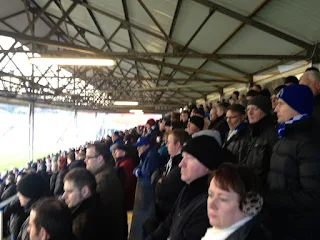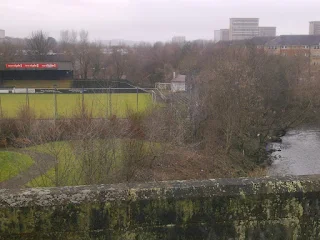Greenock Morton is a professional football club from the old shipbuilding town of Greenock, which is located on the south bank of the River Clyde, approximately twenty-three miles from Glasgow. The club were formed as Morton FC in 1874.
It is thought that Morton comes from a local street called Morton Terrace, which was a road where several players lived. 'The Ton' became founder members of the Scottish League Division Two in 1893-94, moving into their Cappielow Park ground four years later.
Morton were promoted in 1899-00, with the Ton ended in fourth in their debut First Division season before a period of sustained low finishes. Manager Bob Cochrane led the team to another fourth place in 1913-14, which was repeated the following season, before Morton finished third in 1915-16.
There was further improvement in 1916-17 with Morton finishing as league runners-up, followed by successive third places in what turned into a halcyon era for the club, but the crowning glory was to come in the 1921-22 season. Morton won the Scottish Cup when they defeated Rangers 1-0 thanks to a free kick from veteran Jimmy Gourlay in front of 75,000 fans.
The victorious team featured Scotland international winger Alex McNab. By the end of the 1926-27 campaign, Morton were relegated as David Torrance took over as manager, taking the side to promotion as Division Two runners-up in 1928-29. Cochrane had returned for a second spell in charge as the team were demoted in 1932-33.
Jackie Wright was appointed as manager in 1934, leading the side to promotion as runners-up in 1937-38, but the step up proved too much as the Ton went straight back down before the arrival of new team boss Jimmy Davies, who would remain in the position until 1955.
During World War II, Stanley Matthews and Tommy Lawton guested for the club while on service duties before the club was awarded a top-flight place once peace was restored. Morton reached the Scottish Cup final once more in 1947-48, again to face Rangers.
The game went to replay after a 1-1 draw in which Jimmy Whyte scored Morton’s goal, with the Ibrox outfit scoring the only goal in extra time in the second match. The two matches attracted astonishing crowds of 132,629 and then 133,750 to Hampden Park. The team was relegated once more in 1948-49 before being crowned as Second Division champions twelve months later, retaining their top-tier status until 1951-52 when they dropped down once more.
Gibby McKenzie took over as manager in 1955 before being replaced by Jimmy McIntosh a couple of years later, before the appointment of Hal Stewart in 1961. After a couple of narrow misses in the league, Morton reached the League Cup final in 1962-63, going down 5-0 against Rangers in front of a 106,000 crowd.
Morton were promoted as Second Division champions in 1963-64 with the help of the goals of Allan McGraw before dropping back down after two seasons of First Division football. Yet again, the club recovered and collected another second-tier championship at the first time of asking before consolidating their status with Joe Harper putting away the goals.
European football came to Cappielow in the 1967-68 season with Morton competing in the Inter City Fairs Cup, where they were defeated by Chelsea, while a young Joe Jordan started his career at the club before moving to Leeds United. Donald Gillies became a regular scorer in the side where Davie Hayes became a stalwart.
After restructuring and the introduction of the Premier Division for 1975-76, Morton were placed in the second level First Division after a managerial spell from Erik Sørensen. Joe Gilroy had a season in charge before the arrival of Benny Rooney. Andy Ritchie began a career of thrilling the Cappielow faithful with his goalscoring as Morton won the First Division title in 1977-78, before remaining a Premier Division club until the end of the 1982-83 season.
The era saw outstanding service from players John McNeil, Jim Holmes and Roy Baines. Tommy McLean took over as manager for a season, taking Morton to the First Division title before he was replaced by Willie McLean for the 1984-85 campaign, which ended in relegation.
Former star Allan McGraw took over the managerial reins, taking his side to the 1986-87 First Division title as Rowan Alexander top scored. Not for the first time, Morton were relegated after just one season of top-level football. Future club record appearance holder Derek Collins came into the team alongside long-serving goalkeeper David Wylie.
The Ton reached the 1991-92 Scottish Challenge Cup final, before going down 3-2 to Hamilton Academical, before the team was relegated to the Second Division in 1993-94. The third-tier title was won at the first attempt, with Derek Lilley finding the net regularly after the club had changed their name to Greenock Morton to acknowledge their hometown.
Billy Stark came in as the new manager in 1997, as Warren Hawke scored the goals. Morton went down again in the 2000-01 season as the club entered administration with its finances in a perilous state. A second successive relegation followed as the club found themselves in Scottish football's fourth tier.
Fortunately, the club were taken over by confectionery businessman Douglas Rae as the team won the Division Three title at the first attempt in 2002-03 with Peter Weatherson leading the scoring under the managership of John McCormack, as the deciding league game drew a gate of 8,479 to Cappielow.
Jim McInally came in as manager as the team failed to secure another elevation, and he led the side up at the end of the 2006-07 season after three seasons of narrow failure. Morton's promotion to the First Division saw a few seasons of struggle. Managers McInally, Davie Irons and James Grady all took turns to try and lift the Tons to the Premier League without success.
Former winger with several clubs, Allan Moore, arrived from Stirling Albion with a good track record in May 2010. He came close to taking Morton back to the Premier League in 2012-13, but they lost in the title race to Partick Thistle, eventually finishing as runners-up after Peter MacDonald had led the forward line to great effect.
The Ton were relegated the following season with Kenny Shiels in charge of the side before he was replaced by Jim Duffy. The goals of Declan McManus helped Morton to the League Two title in 2014-15 and an immediate return to the second tier, where they consolidated with Denny Johnstone leading the scoring.
A fourth place in 2016-17 led to the play-offs, where Dundee United ended any dreams of promotion. Ray McKinnon took over from Duffy in May 2018, lasting until August when he was tempted away by Falkirk’s overtures. Jonatan Johansson was appointed in his place.
Former Scottish international David Hopkin was appointed as manager in May 2019, with Bob McHugh’s goals helping the side to seventh place when the 2019-20 season was ended early owing to the outbreak of Coronavirus. It was announced in July 2020 that ownership of the club would be passed on to the fans group ‘Morton Club Together’ for a nominal sum in March 2021.
That was on the provision that they could prove its sustainability to owner Crawford Rae, who wiped off debts and turned down more lucrative offers. Gus MacPherson was appointed manager in March 2021 as the club secured their Championship status with playoff victories over Montrose and Airdrieonians.
Dougie Imrie took over the managerial reins at Cappielow in December 2021, taking the side to consecutive fifth-place finishes.
Greenock Morton FC will play in the Scottish Championship in the 2025-26 season.
Greenock Morton 2 Livingston 1 (Saturday 19th January 2013) Scottish League Division One (att: 1,913)
It was that time of the year when I had a weekend off work and decided that a lads away was in order. After visiting Dusseldorf the previous year, my good pal Karl Theobald expressed an interest in visiting Glasgow. That was fine for me, as I'd enjoyed several great nights out there in the past. We'd gone on a tour of Ibrox on the Friday evening before enjoying a very good night out.
After a beer in the Crystal Palace, which was filling with Celtic fans, we jumped aboard the Gourock train, alighting at Cartsdyke. After a short walk, we found ourselves in a bar, which I think may have been called The Norseman. The place had seen better days, but haven't we all and the welcome was warm.
We enjoyed a couple of Tenants while chatting to fans of both sides. There was certainly plenty of away support enjoying the warmth. At around 2.45, we entered Cappielow for £15 and immediately fell for the place. The Main Stand was long and low with a raised seating deck and magnificent floodlights raised on the roof and the railway line behind it.
The locals roared their team on, with some of the distinguishable comments making us laugh out loud. They certainly didn't take kindly to the antics of a visiting player who fell over, despite being nearly snapped in half by one of their heroes. The rich accents only added to the effect.
A fine move from a corner led to Martin Hardie firing Morton ahead. They played some nice stuff, but lost their way somewhat as the talented visitors got a hold of the game.
We went and stood on the open end with around ten minutes to go, before making a bolt for it five minutes from the end. We wanted to catch the 4.51 train back to go for a meal and to prepare for our Saturday night out, as otherwise we'd have been waiting for a further thirty minutes in what was, in all fairness, not a great place.
A home fan was standing on the bridge at the station, where he was following the crowd's reaction as a guide to the action. The crowd at the back were visible, but not the players. Karl mentioned that we were surprised at the gate figure that had been announced. Our pal said something along the lines of "Oh, they're at that game again."
























.png)
.jpg)
.jpg)





































